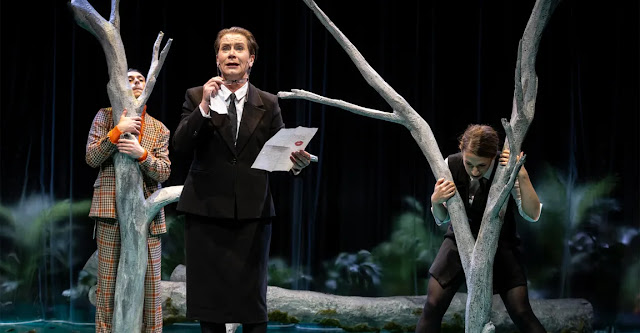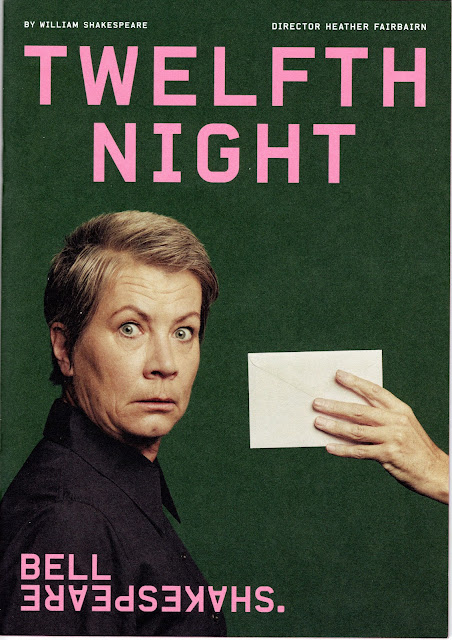Twelfth Night; or What You Will by William Shakespeare. Bell Shakespeare at Canberra Theatre Centre Playhouse, October 13 – 21, 2023. Saturday at 1pm, 7pm; Sunday 4pm; Tuesday/Wednesday 6.30pm; Thursday/Friday 7pm; Saturday 1pm, 7pm.
Reviewed by Frank McKone
Opening Night, Canberra
Cast:
Malvolia – Jane Montgomery Griffiths Toby Belch – Keith Agius
Sebastian / Viola – Isabel Burton Viola – Alfie Gledhill
Maria – Amy Hack Orsino – Garth Holcombe
Andrew Aguecheek/Captain – Mike Howlett Feste – Tomáš Kantor
Antonio – Chrissy Mae Olivia – Ursula Mills
Creatives:
Director – Heather Fairbairn
Set & Costume Designer – Charles Davis Lighting Designer – Verity Hampson Composer – Sarah Blasko Sound Designer – David Bergman
Sound Associate – Daniel Herten Choreographer – Elle Evangelista
Voice Coach – Jack Starkey-Gill Fight & Intimacy Director – Nigel Poulton
 |
| Mike Howlett (Andrew Aguecheek), Jane Montgomery Griffiths (Malvolia), Amy Hack (Maria) |
Bell
Shakespeare have made the most exhilarating, imaginative, highly
original interpretation of William Shakespeare’s most often performed
play, Twelfth Night. Whatever else you have to do this week, make sure you don’t miss What You Will, and find out what Will really meant.
What he didn’t mean is the Canberra Times headline “The rom-com that never gets old”
London, Christmas holidays 1600-01, population 200,000, was half the
size of Canberra today but as politically aware as we are. The
progressive Queen supported theatre arts while the 'no' voting Puritans
did their best to shut theatres down. The story of the rich
rabble-rousers Toby Belch and Andrew Aguecheek, via the incisive wit of
the servant woman Maria, making such nasty fun of the puritanical
Malvolio was chosen by Elizabeth and her Court for Christmas
entertainment, rather than Ben Jonson’s satire of his theatre
colleagues, The Poetaster.
Jonson was lampooning other
playwrights but “he could not shove Will in with the rest of the
poetasters. He was too big for easy lampooning. Moreover, Ben – as he
acknowledged later in print – could not deny Will’s free and open
nature, his lack of niggling jealousy. In spite of everything, they
were friends.” Sounds a bit like what perhaps goes on off-stage among
the many theatre groups in Canberra! (Shakespeare by Anthony Burgess: Jonathan Cape 1970 pp179-80).
And
now, Bell’s director Heather Fairbairn has brilliantly taken
Shakespeare an extra step forward in time. Making Malvolio into a
woman, Malvolia, makes the comedy even funnier – very much in
keeping with Will’s love of word play and sexual confusion – so we now
have Viola, Olivia and Malvolia. There’s the ‘com’.
But
Shakespeare’s ‘rom’ in this play was never sentimentally romantic, and
as Fairbairn has pointed out, all parts were acted by men and boys (who
were given special apprenticeship training to play women). The Poetaster was about these boys and women’s parts. Thomas Dekker attacked Ben Jonson back, with a play called Satiromastix, or The Untrussing of the Humorous Poet.
This is the social context of William Shakespeare that Heather
Fairbairn has understood – centuries before what we call naturalism on
stage was invented by Henrik Ibsen (in A Doll’s House, 1879).
So
the treatment of Malvolia, handcuffed and imprisoned in darkness, has a
new unromantic meaning in our ‘MeToo’ world – about the far too common
violence against women and the political issue of women’s empowerment.
It’s both horrifying and powerful in the finale of Bell Shakespeare’s
production to see Malvolia rise from the dark into the light. The
audience on opening night cheered to see her resurrection. And
applauded, in my view, one of the best Bell Shakespeare productions
ever.
 |
| Garth Holcombe (Orsino), Alfie Gledhill (Viola) |
 |
| Mike Howlett (Andrew Aguecheek), Keith Agius (Toby Belch), Amy Hack (Maria) |
I
say this because the originality in casting was wonderfully backed by
an over-the-top style of acting, in absolutely extraordinary costumes,
even more extravagant than Shakespeare himself could ever have imagined –
but if he could be here in modern times he would surely be as
enthusiastic about Charles Davis’ designs as the whole cast obviously
are about performing in them.
As he would be too, about the
characterisation of the Fool, Feste – the wildest philosopher, singer
and disturber of our understanding of truth & falsity I have ever
come across.
The amazing thing about this production is that
there are so many angles of thought it generates – for us, as I’m sure
it was for Will Shakespeare ‘celebrating’ Christmas (you’ll notice, by
the way, that God never gets a mention in any of his plays – damned by
the Puritans).
It’s not just about the stupidity of love (‘rom’)
or the funny side of ruining other people’s reputations (‘com’), or the
personal and political effects of women’s roles in a patriarchal
society, but – via Feste and the entire impossibility of completely
indistinguable brother/sister twins – even about the Donald Trumpian /
social media post-truth world issues where conspiracies are taken to be
real, logic need not be followed, and Me-Me is the only guideline.
Shakespeare
understood this in the absurdity of the first lines by Duke Orsino, not
so much in “If music be the food of love, play on” (though some have
noted the whole play begins with an uncertainty in the word “If”), but
in his demand:
“Give me excess of it, that, surfeiting,
The appetite may sicken, and so die.”
And
if you want to go further, though Shakespeare wouldn’t have seen this
before the industrial revolution, you can see today the result of such
desire in the demand for ever increasing ‘economic productivity’,
‘profit-making’, and ‘development’ causing us to sicken and die from
fossil fuel use and the resultant climate change.
 |
| Ursula Mills (Olivia), Isabel Burton (Sebastian), Tomáš Kantor (Feste), Chrissy Mae (Antonio) Garth Holcombe (Orsino), Alfie Gledhill (Viola) |
And
that’s not even mentioning the issue of war, which in Twelfth Night
appears in the story of Antonio, the rescuer of Sebastian from the
shipwreck which begins the play. He is afraid to go ashore because
previously he had captained his ship in war against Illyria.
“I have many enemies in Orsino’s court,
Else would I very shortly see thee there.” (Act II, Scene 1)
And then, indeed, in Act III Scene 4, he is recognised:
Second Officer: Antonio, I arrest thee at the suit
Of Count Orsino.
Antonio: You do mistake me, sir
First Officer: No, sir, no jot: I know your favour well,
Though now you have no sea-cap on your head.
Take him away: he knows I know him well.
Antonio: I must obey.
[To Viola, who he mistakes for Sebastian]
This comes with seeking you;
But there’s no remedy: I shall answer it.
What will you do, now my necessity
Makes me to ask you for my purse? [which he had given to Sebastian]
It grieves me
Much more for what I cannot do for you
Than what befalls myself. You stand amazed;
But be of comfort.
Second Officer: Come, sir, away.
Antonio: I must entreat of you some of that money.
Viola:
What money, sir? [She offers to lend him some, but Antonio
thinks she is Sebastian refusing to give his money back]
They argue vociferously until the officers finally drag him away.
In
the text, Act V, Scene I, when Antonio is under guard, and Sebastian
and Viola appear at last together, there is no stage instruction. In
Fairbairn’s production, Orsino quietly unlocks Antonio’s handcuffs; but
despite his earlier explanation to Orsino how he had rescued Sebastian,
but “I confess, on base and ground enough, Orsino’s enemy”, it seems to
me that Shakespeare left him to be Orsino’s prisoner with no softening
for his good deeds.
As Feste sings finally, Shakespeare was not
under any illusions about reality. His Malvolio “hath been most
notoriously abused” says Olivia, and the Duke orders “Pursue him, and
entreat him to a peace”; but what peace can there be for Heather
Fairbairn’s Malvolia? As little, I suspect, as for Will Shakespeare’s
Antonio.
A great while ago the world begun,
With hey, ho, the wind and the rain;
But that’s all one, our play is done,
And we’ll strive to please you every day.
I
think Will means the simple truth is, however much you enjoy the Bell
Shakespeare play as I did, that in the end, “The rain it raineth every
day”.
©Frank McKone, Canberra

1 comment:
Cry God for Harry, England and St George?
Post a Comment